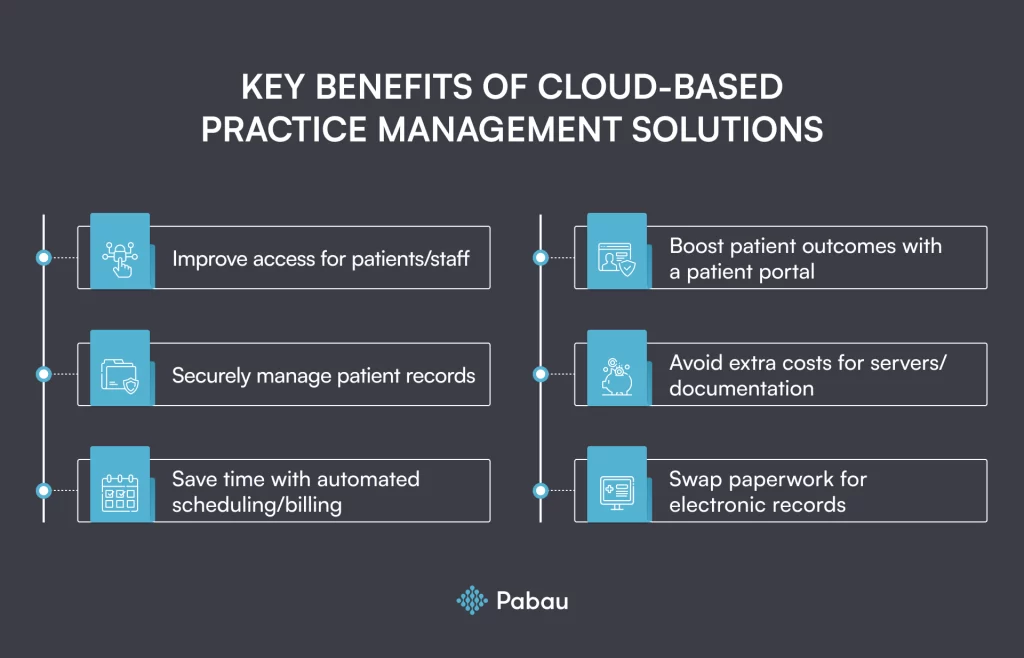As a healthcare business, there are so many problems practice management software can solve for you. Automated payments, seamless scheduling, reports running like clockwork, a stress-free team, and happy patients — the benefits pile up from there.
But, standardized practice management software will only get you halfway. To walk that extra mile and streamline daily operations, tend to patients faster, and boost overall efficiency, you don’t need just any software; you need a cloud-based solution.
Cloud management solutions can do it all — but what makes a top-tier tool versus a ‘meh’ one? Let’s throw a showdown — here are the seven best cloud-based practice management systems to keep your patients happy and set your practice on the path to success.
What is a cloud-based practice management system?
A cloud-based practice management system is a software application that helps healthcare practices manage everything from daily operations to client interactions.
Unlike on-premise software, a cloud-based medspa solution is available entirely online, which makes it super handy for accessing vital information whenever, wherever. Set up the cloud once and it will automatically run complex processes, from reporting to patient scheduling.

Key features to consider when choosing a cloud-based practice management system
When time is short and your tasks are piling up, managing your practice can send you into overdrive. To get the workload off your desk without breaking a sweat, you need to look for comprehensive cloud-based practice management tools.
Here are some of the core features to consider when choosing the best cloud-based practice management system.
Appointment scheduling and management
Having a cloud-based system means never worrying about manually handling appointments again. With features like an integrated calendar, you can get a comprehensive overview of your team rota, past and upcoming appointments, pre-care notes, and other booking details— organized in one easy-to-use calendar.
You can also automate essential tasks such as sending appointment reminders, and forms, to enhance patient engagement. Setting up automatic deposits, on the other hand, can potentially reduce no-shows by 17%.
A cloud-based scheduler works wonders for managing multiple practice locations, too.
Providers can effortlessly oversee their whole week and track patient activity in real-time, successfully preventing bottlenecks while optimizing patient care anywhere.
Payment processing and management
With automated billing and online payments (plus a Xero integration), you can swiftly streamline transactions efficiently. On one hand, features like credit card processing can ensure quick and secure payments. On the other, setting up deposits for specific services or clients can help reduce no-shows and increase revenue.
Opting for cloud software that integrates with accounting apps is smart. You’ll improve overall financial management and ensure error-free workflows.
Here’s another kicker — customizable invoices. Clients receive a clear breakdown of their payments, while providers can include specific details for each patient — like meds, and services, alongside everything else they paid for. It’s all about simplifying the financial side of healthcare while streamlining efficiency.
Documentation and reporting
Cloud-based software helps practices make the shift from paper to digital records, securely storing all relevant documentation in one easy-to-access location.
Easily manage various documents online, from medical questionnaires, to patient records, to invoices, lab results, and inventory, with swift, 24/7 access. No more having to print off intake forms when a patient arrives or rifling through cabinets for a record!
Quality reports are also essential for tracking performance and pinpointing areas for improvement. With a cloud solution, you can set up specific reports to run automatically, gaining valuable real-time insights in turn. Smart reports are your biggest growth ally, allowing you to make data-driven decisions in real time for maximum success.
Patient portals
Patients don’t really care for technicalities. They just want convenience, like being able to easily book/pay for services, manage their appointments, and avoid unnecessary calls or trips to your practice.
This is where a robust cloud-based patient portal is essential. It enables patients to sign consent forms, book and reschedule appointments, track lab test results, and review invoices while offering direct access to their appointment history and past communications.
Client portals can be a huge deal-breaker — 75% of patients said they’d be more likely to show up for appointments if they could reschedule them online.
HIPAA compliance
Every practice must follow HIPAA regulations to safeguard sensitive patient information.
So, the software you choose must seamlessly support your HIPAA compliance, ensuring the secure handling, storage, and sharing of patient information. This can be done by enforcing multiple layers of protection, such as robust encryption, session timeouts, and access controls.
With 725 patient data breaches reported to the OCR in 2023, clients consider data insecurity a red flag — the last thing they desire is to see their treatment diagnoses or before-and-after photos leaked on the internet. Prioritizing HIPAA compliance not only fulfills regulatory obligations for your practice but also instills trust and security in your patients.
Need help with meeting your HIPAA compliance? Download our free checklist below! 👇
The 7 best cloud-based practice management solutions
Selecting the right cloud-based software solution is crucial for seamlessly operating your practice. You’ll automate client and appointment management, secure patient communication, and provide insightful reports for optimal scalability.
Here are the seven best cloud-based practice management systems tailored to meet your specific needs.
1. Pabau
Pabau is an all-in-one medical practice management software for healthcare professionals. Accessible on the cloud via all devices, it’s a robust scheduling tool with an equally robust EHR system that will enable you to manage patient information seamlessly.
Send seamless patient communication in the form of automated reminders, intake form requests, and pre-care/follow-up care — all securely stored in online patient records.
The Pabau patient portal ensures timely care by providing direct client access to treatment details, from lab test results to before-and-after photos, payments, and appointment management. (If you wish. If not, you can toggle these settings off.)
Pabau supports HIPAA and integrates with Xero, enabling secure payments, medical records, telehealth appointments, and reports. Speaking of, Pabau packs a range of pre-built and customizable reports for real-time performance tracking, daily or monthly.
Notably, Pabau boasts one of the most comprehensive calendars, with a clear, visual display as well as drag and drop functionality and smart filters for specific data viewing.
With customizable invoices, multi-location support, and a user-friendly interface, Pabau makes a superb all-hands-on-deck solution for efficient practice management.
Key features – appointment scheduling, patient portal, HIPAA, calendar, reporting
Industries – healthcare practices, med spa clinics and salons
Pros
- Scheduling and appointment management system
- Comprehensive client card with forms, photos, financials, and more
- Robust integrations — Stripe, QuickBooks, Xero, Google Calendar, etc.
- Automated reporting, medical billing, and marketing
- An all-in-one solution — doesn’t require separate tools which may cost extra
Cons
- No free tier
- Might be a pricier investment for smaller businesses
2. AthenaHealth
AthenaHealth, a.k.a AthenaOne, is a US-based healthcare provider providing cloud-based services and apps for electronic health records (EHR), revenue cycle management, and patient engagement.
It offers a user-friendly patient portal for easy management of lab results, prescription refills, and appointments. A notable addition is Nuance, a hands-free speech-to-text dictation app enabling real-time documentation. Athenahealth also incorporates HIPAA-protected medical photography for efficient treatment journeys, and shines with a rich offering of built-in and customizable reports, for easier performance analysis.
On the flip side, AthenaHealth has been criticized for its lack of transparent pricing, charging extra for third-party integrations. This makes it a pricier option compared to alternatives. AthenaHealth has also faced contract breach charges, raising concerns about security for healthcare businesses.
Key features — online scheduling, patient portal, reporting, Marketplace, revenue cycle management
Industries – small to medium-sized practices and hospitals
Pros
- Great for large practices
- Robust reporting features
- Good customer support, via 24/7 live chat, email, etc.
Cons
- Not the best for smaller healthcare practices
- Starting price doesn’t include medical practice management/billing services
- Incomplete billing system
- No allergy alerts for counter-effective meds
3. Practice Fusion
Practice Fusion, a cloud-based EHR system for small practices, allows you to successfully manage patient journeys. The patient portal enables access to test results and appointment management, whereas the robust reporting provides detailed insights into drug interactions, billing, bookings, and e-prescriptions.
However, being an EHR system alone makes Practice Fusion incomprehensive for practices that might require a scheduler so their clients can book appointments.
Plus, with only one subscription plan, Practice Fusion charges extra for third-party integrations, making it relatively costly. Not to mention, users reported weak interoperability (how it works with other systems), further limiting the system’s accessibility.
Practice Fusion is a great choice if all you’re after is a solid EHR system. Despite facing some reputational issues in the past, it remains one of the largest cloud-based EHR platforms in the US.
Key features — billing, scheduling, patient portal, reporting, HIPAA, e-prescribing
Industries — smaller medical and care professionals; analysts
Pros
- Specialty-specific charting templates
- They have a single plan of $149 per provider, per month
Cons
- Their plan requires an annual commitment
- Extra fee for third-party integrations
- Providers can’t edit messages
4. TherapyNotes
TherapyNotes is a cloud-based EMR and practice management system for mental health professionals. They excel in e-prescribing, offering a 24-month medication history and secure prescriptions, supported by HIPAA and two-factor authentication.
On top of that, they offer a seamless patient portal for requesting prescription refills, verifying drugs, and managing appointments.
With a free trial and packages starting at $49/month, TherapyNotes is affordable. However, they have limited third-party app integrations and mostly support mental health practices, making it less comprehensive for other specialties.
Their reporting features, while available, offer limited insights into revenue and staff performance. Plus, medical professionals have noted that their patients aren’t notified if clinicians cancel appointments, which can compromise timely updates essential for efficient patient journey tracking.
Key features — client portal, HIPAA, appointment management, scheduling
Industries — psychology, mental health, behavioral health
Pros
- Excellent user experience
- Telehealth platform available
- Supports e-prescriptions
Cons
- No mobile app available
- Cannot add client information in batches
- Limited reporting capability
- Appointment reminders are charged 14 cents, each
5. WebPT
WebPT is user-friendly cloud-based software designed for rehab therapy and behavioral health management. It streamlines workflows, prioritizes HIPAA compliance, and offers robust clinical record management with features like customizable SOAP notes. The platform supports faster billing and is great for managing telehealth appointments.
The patient portal module allows advanced form completion via email/text. However, this module is limited, lacking comprehensive features such as direct appointment scheduling and direct patient/clinician communication.
WebPT charges practice by the day, which can be tiring for some businesses to manage. At the same time, features like external document storage, scheduling, and appointment reminders are only included in their higher pricing plan.
Overall, while it’s a great option for rehab centers and physical therapy clinics, WebPT’s functionalities may be limited for other healthcare niches.
Key features — billing, scheduling, patient portal, HIPAA, documentation
Industries — physical therapy, behavioral therapy
Pros
- User-friendly
- Insightful reporting
- Drag-and-drop scheduling
- Intake forms for populating clinical notes
Cons
- No mobile app
- Limited patient portal
- Plans that charge by the day
- Unsuitable for different healthcare specialties
6. Intergy EHR (by Greenway Health)
Intergy EHR is a cloud-based software tailored for ambulatory health practices, providing services on an outpatient basis, without requiring hospitalization. It offers HIPAA-protected clinic management features like telehealth appointments and a patient portal for lab results, prescription refills, appointments, and payments.
While it features 500+ customizable report templates, their reporting is still limited, requiring users to use Practice Analytics—an additional software, at an extra cost. Intergy supports multiple locations, although users have noted challenges when scheduling multiple patients in the same slot. They also have limited third-party app integrations, without comprehensive calendar sync, making simple processes more complex.
Overall, Intergy is a decent solution if you only need customized reports and remote care management. However, its complex billing system and lack of vaccine management options make it a less-than-ideal option for most practices.
Key features — billing, patient portal, HIPAA, reporting, telehealth
Industries — primary care, internal medicine, multi-specialty, OB-GYN, cardiology
Pros
- Customizable documentation
- Detailed appointment/health reminders
- Swift task manager
Cons
- Hidden costs for training/extra tools
- Limited third-party integrations
- No Excel for robust reporting
- Physician charts are not user-friendly
7. Dentrix
Dentrix is a top-tier dental practice management software known for its efficiency. It excels with features like Dentrix Smart Image for 2D/3D imaging and QuickBill for automated statements. The platform facilitates seamless payments and offers two-way texting and automated reminders for engaging patients and filling in appointment gaps.
Their color-coded scheduler simplifies appointment booking, whilst its note-taking, e-prescription, and robust charts (Odontogram/Perio charting) contribute to efficient workflows and successful treatment outcomes.
However, Dentrix falls short in customizable reports and comes with a price tag of $500/month for up to 10 users, plus a $995 setup fee. While it is tailored for dental practices, it may not fully meet the needs of healthcare practices in other specialties.
Key features — appointment management, scheduling, billing, patient portal, HIPAA
Industries — dentistry
Pros
- Good patient management and record-keeping
- Solid revenue tracking capabilities
- Fast SMS reply system
Cons
- Not suitable for multi-location practices
- Limited demographics
- Does not let users customize reports
- Extra charge for initial setup
Find out why Pabau is the best cloud-based practice management solution today!
The right cloud-based practice management system needs to align with your needs, budget, and the industry you work in.
For med spas, medical practices, beauty salons, and other healthcare businesses, Pabau combines the best of both worlds — a user-friendly scheduler, plus an EHR system to power your operations, plus hundreds of other features to save you time each week.
Automatically send appointment reminders and consent forms, pre-care and aftercare instructions, and share patient information securely through our HIPAA-friendly client portal. Ensure privacy with access controls and seamless communication on all devices.
Plus, customizable reports will help you track revenue and grow your business. Pabau adapts to your needs, supporting remote patient treatment and multi-location management.
Prioritize efficiency without compromise — book a demo today and let Pabau streamline your practice management, tailored to your unique requirements.





